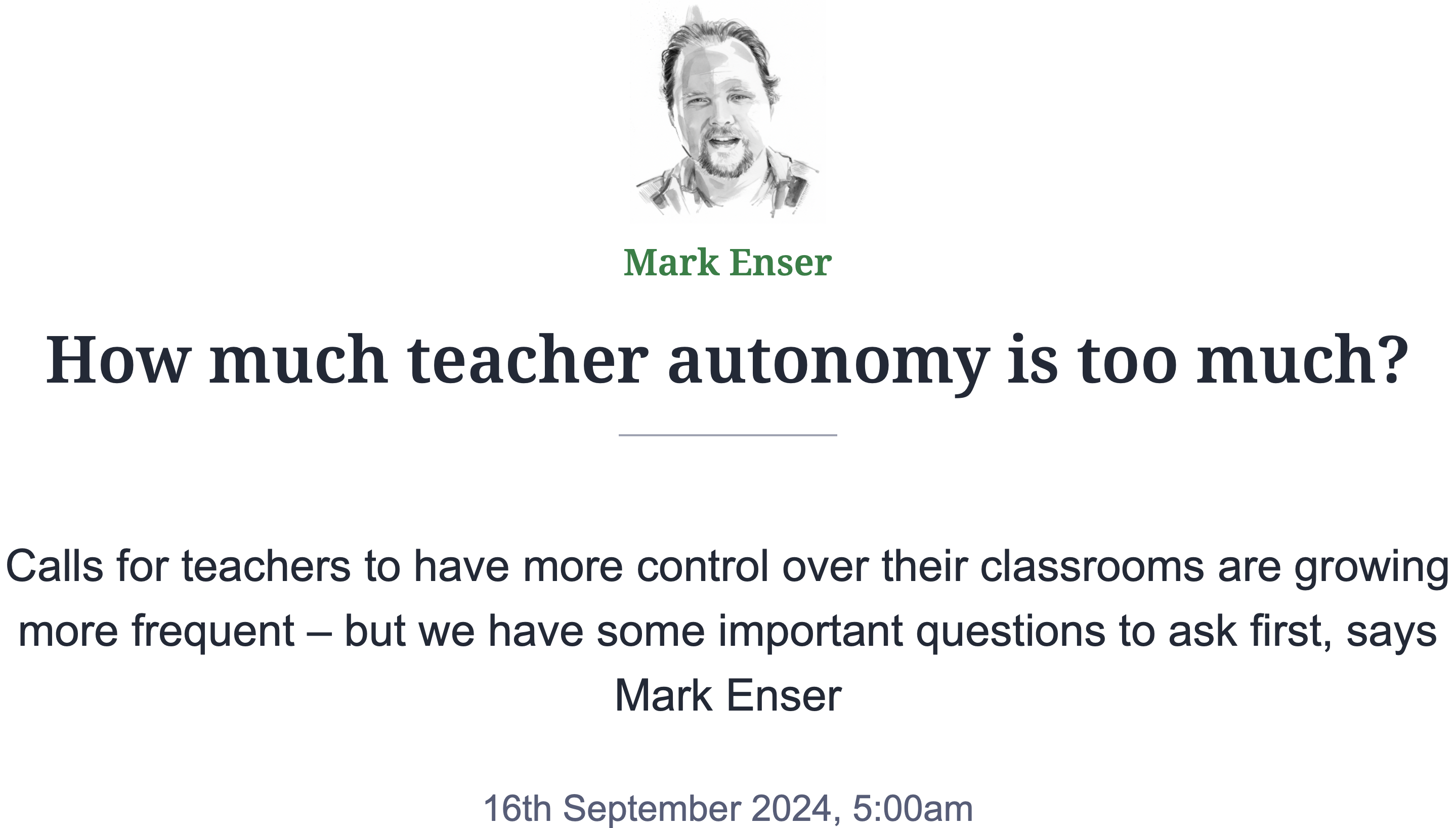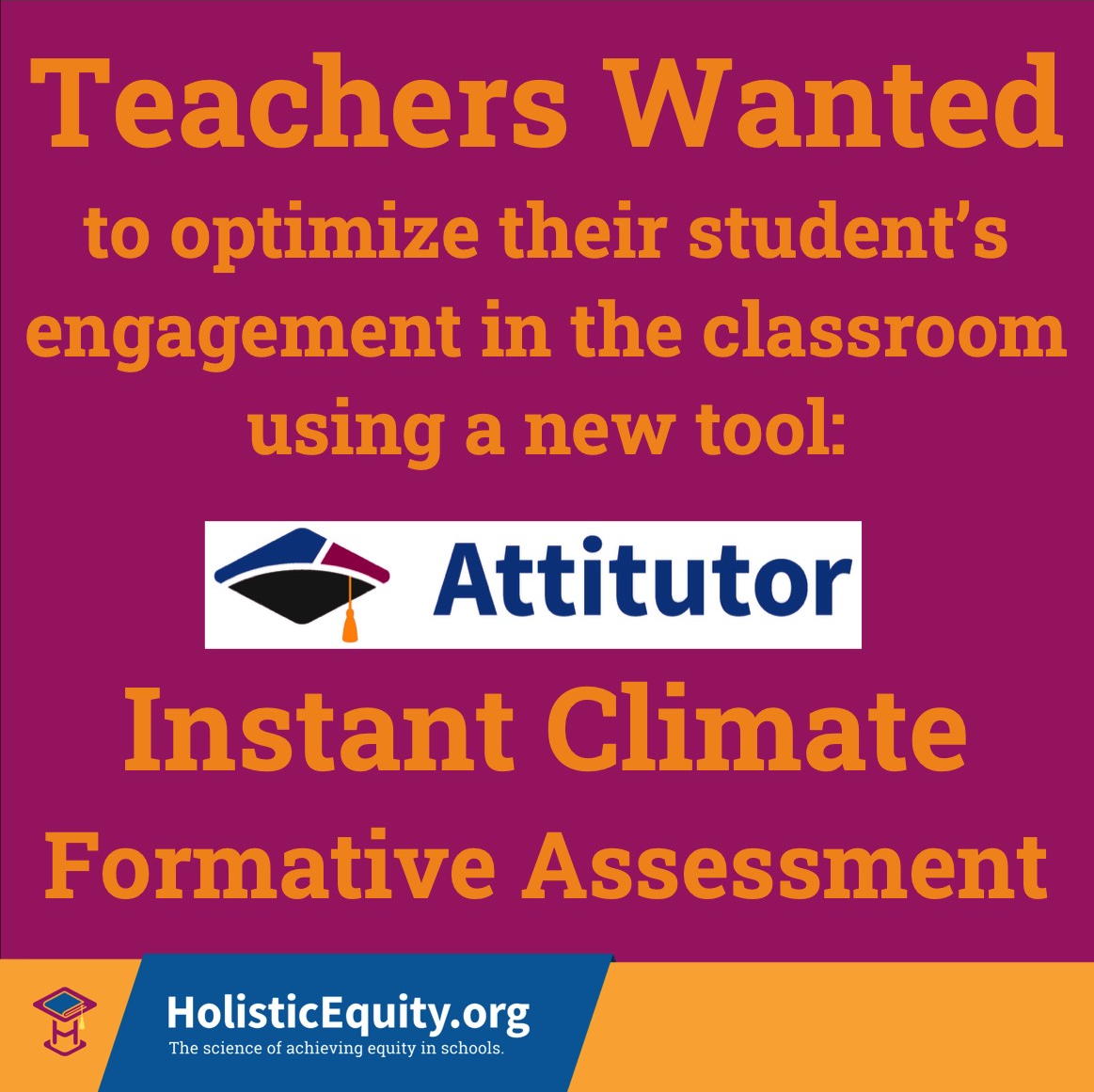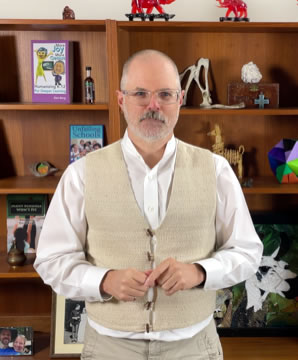When you say teacher autonomy,
do you mean political or psychological?
“How much teacher autonomy is too much?” was asked recently as the title of an article by Mark Enser in TES Magazine (originally the Times Educational Supplement, UK).
The phrase “teacher autonomy” caught my eye because of the difference between the everyday use of the word “autonomy” in education and the use of the word in my area of psychology, Self-Determination Theory.
Later, I will discuss the relationship between the “political autonomy” that the article was referring to and the “psychological autonomy” that constitutes a need, but first, let’s explore variations on the titular question to illustrate the importance of psychological autonomy:
1. How much teacher air is too much?
2. How much teacher oxygen is too much?
3. How much teacher carbon dioxide is too much?
4. How much teacher food is too much?
Numbers 1 and 4 state primary human physiological needs using commonsense terms, while 2 and 3 use technical terms for the two most important active ingredients of the need for air. Number 1 is an unanswerable question.
That is why I included numbers 2 and 3, which are answerable questions that are critically important to the need for air.
Oxygen is the nutritive component of air, but it is also toxic above a certain concentration.
Oxygen comprises 19-23% of healthy air. Carbon dioxide is the toxic by-product of our breathing process; healthy air must not have more than about 1% carbon dioxide.
How people breath in the air that they need to live does not appear to be a problem, except in some esoteric yoga circles.
The COVID-19 pandemic gave those of us without rare medical conditions a mere glimpse of what taking personal responsibility for our air quality could entail.
It was only a glimpse because the measures that were recommended only applied to situations in which we were sharing air with others.
As someone who has worked as an activist on the issue of air pollution in the USA I know that there are problems with our air quality.
As a society our state and federal governments permit a variety of industries and other organizations to put pollutants into our air.
There are a few people with rare medical conditions that must take personal responsibility for filtering out those toxins.
Taking personal responsibility for the quality of the air we breathe is costly and inconvenient, which is why fighting air pollution is far more effective at the level of societal regulation of polluting industries rather than exhorting individuals to take personal responsibility for cleaning their own air.
On the other hand, when we look at the need for food, especially here in the USA, we recognize that there are both societal and personal means of addressing people’s over-eating problems.
Food consumption is a need in which personal self-control is a far more significant factor than in air consumption.
There is a whole industry of people who profit from exhorting “fat” people to exert more self-control over their eating habits.
Plus, there is an even larger industry that makes profits off of exploiting the biological mechanisms that govern personal eating behavior to get those same folks to exert less self-control.
Your local grocery store places certain food items in the checkout lanes in order to take advantage of the fact that some shoppers’ self-control mechanisms have been weakened by making numerous buying decisions before arriving in front of a variety of tempting sugary treats.
There is one primary human psychological need relevant to education which is more like food than air; it is sleep.
Children can be entirely supplied with food from home in most cases. In the same way, most children get their sleep at home rather than at school.
Keep in mind that some needs can be supported from afar, like food, while other needs must be supported in the present situation, like air.
Parents can send food to school from home to support a student’s need for good nutrition, but no parent has ever sent their child to school with a self-contained breathing apparatus, which is what firefighters and SCUBA divers use, in order to support their need for good air.
When we discuss psychological autonomy remember that, except for sleep, the psychological needs are more like air than food.

Teacher Autonomy is a Need
Now you may want to know what those psychological needs beyond sleep are.
According to decades of well replicated research primarily done by the Self-Determination Theory community, our primary psychological needs are for autonomy, competence, and relatedness.
What we also know from that community is that the satisfaction of those needs leads to more autonomous motivations while thwarting them leads to more controlled motivations.
Having more autonomous motivations leads to both agentic and behavioral engagement, while more controlled motivations leads to merely behavioral engagement or to disengagement.
In my book The Agentic Schools Manifesto I asserted that the distinction between an educative experience and a non-educative one is the presence of agentic engagement, or just agency.
So the central need that all students have is for agency, which we can call an educational need.
I am especially fond of the term “agency” because in English it has two connotations that are sometimes thought to be opposed to each other.
Agency means having the ability to act effectively for your own interests, but it also means acting on behalf of some collective.
We talk about insurance, real estate, and other types of agents as representatives of their company or their clients.
This meaning of agency comes with the strong implication that they are forbidden from representing their own interests when the act out that role.
In education I think that it is important to recognize that the learner is simultaneously an embodiment of their own interests and embedded in collective interests.
Those two sets of interests cannot be separated or isolated from one another, which is an important distinction from other uses.
Teacher Autonomy is also a Political Reality
Now let’s consider what was meant by “teacher autonomy” in the educational context of the original article:
“The calls for more teacher autonomy are frequent and loud. Most often they are heard when people complain about what they see as overly prescriptive curricula and lesson plans coming from academy trusts, or from centralised assessments. Sometimes, it is teachers arguing for more autonomy around things like behaviour management approaches in their classrooms. Whatever the issue, the message is the same: they are the professionals in the classroom and they would like to make the decisions about what happens there.”
The essence seems to be how other people are making decisions on behalf of teachers.
This means that the “autonomy” referred to here is political autonomy where there is an inherent tension between the interests of the individual and the collective.
Given that there are these two different kinds of autonomy, political and psychological, the question is how much importance should we give each?
I arrive at the same answer regardless of whether I use a logical or moral lens; psychological autonomy has to be a higher priority because it is the right thing to do for teachers and students plus it is also the only logical means of achieving the most fundamental purpose of schools.
What purpose is so fundamental that it can override all others?
The most fundamental purpose of schools is to facilitate deep learning.
There is no point to forming schools if they are not capable of enabling citizens (of any age) to attain a better grasp on reality.
Attaining a better grasp on reality inherently requires learning that is more than a trivial accumulation of knowledge, skills, and information.
That trivial accumulation is the shallow type of learning that merely reinforces whatever existing models of the world already drive the student’s behavior.
Only the facilitation of deeper learning is worth the extraordinary effort and cost of setting up institutions for schooling.
Deeper learning requires both teachers and students to have a level of well-being that enables them to be in an open state of mind.
Attaining that level of openmindedness is only known to occur in schools when both students and teachers have their primary psychological needs satisfied, which includes the need for autonomy.
Thus, psychological autonomy is both a logical and moral imperative of schooling.
The proper question to ask is:
How much political autonomy is required in order to ensure that all the teachers and students have their need for agency sufficiently satisfied to achieve the openmindedness that is required for deeper learning?
Even that question is unanswerable, but I know that there are measures from Self-Determination Theory that can help us make observations of key components.
The key components are psychological need satisfaction, patterns of motivation, and depth of engagement.
If you would like to learn more about how teachers and/or principals can use those measures I welcome you to look at the top of this page on HolisticEquity.org, click on the Tools tab, and click on Climate Tool.

This article was printed from HolisticEquity.com




